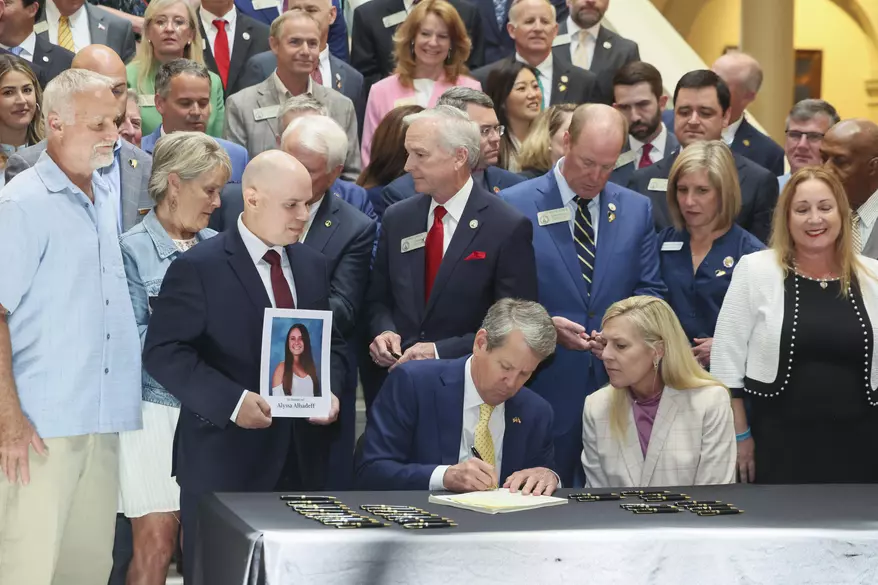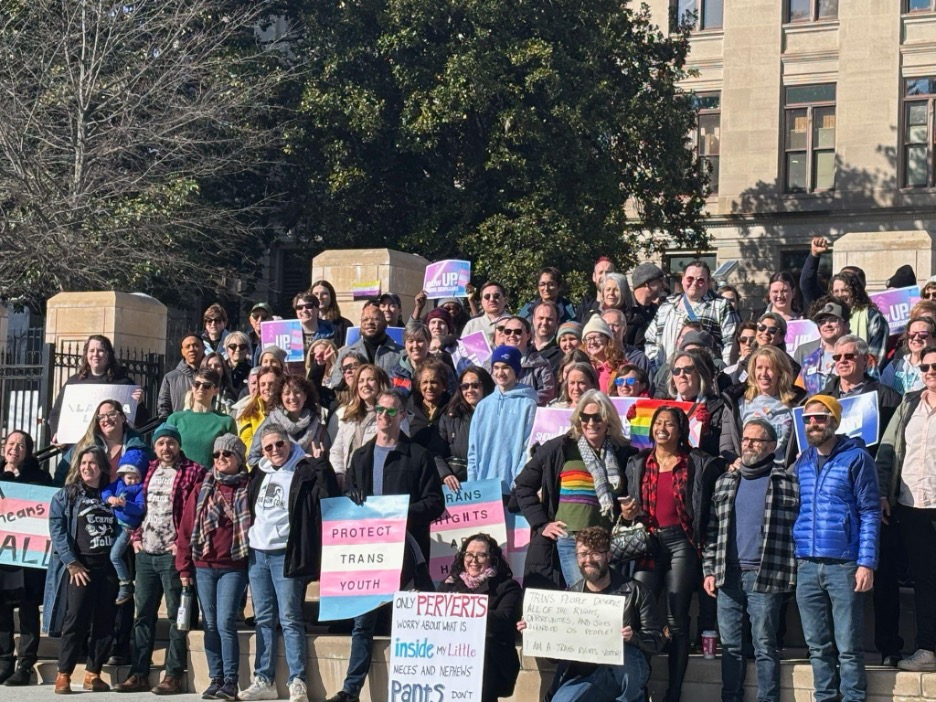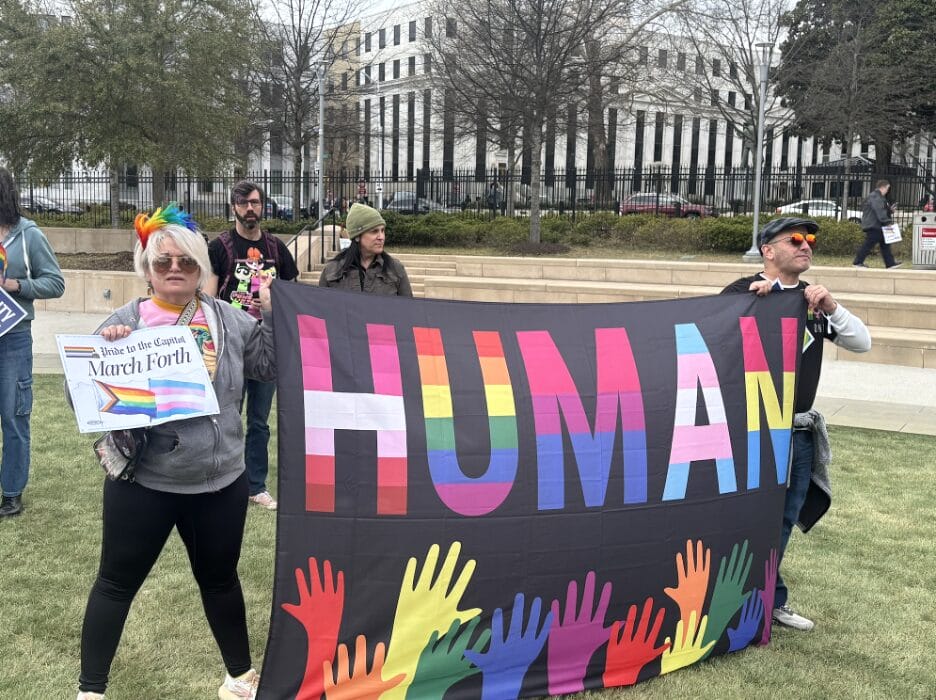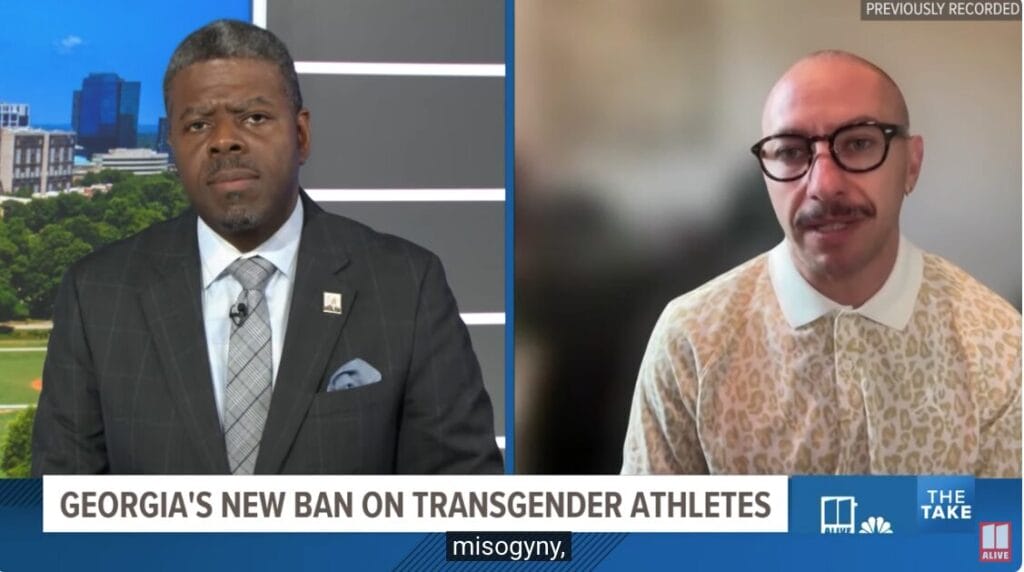Shane Diamond (he/him), GLAAD’s Director of Communications and Transgender Advocacy, joined 11Alive, the NBC affiliate in Atlanta, to discuss the The Riley Gaines Act, a law signed this week by Georgia Gov. Brian Kemp. The law bans transgender student-athletes from participating in sports and from using the correct restroom and locker room that aligns with their gender.
The new law was a top priority of conservative legislators at the start of the legislative session and takes the unprecedented step of targeting transgender student-athletes despite there being zero transgender athletes currently competing in the state.

11Alive anchor Jessie McNeill played a recording of Kemp saying, in part, “I learned a lot of valuable lessons about life on the football field and the baseball diamond growing up…” when signing the law.
“I agree with Governor Kemp that all kids should have an opportunity to participate in sports,” Diamond said, “to learn lessons that we can only get through participating in sports, lessons about how to win and not gloat, how to lose and not be a sore loser, about accountability, teamwork. But I disagree with Governor Kemp that we need to exclude transgender children and transgender youth in order to do that. Every youth deserves the opportunity to participate in sports with their peers, and that includes transgender youth.”
Diamond continued, “This actually has nothing to do with transgender youth or transgender student athletes. This is being used as a wedge issue… and trans people like me, trans youth all over the country are being caught in the crosshairs of a fight that actually has nothing to do with us but is being used as a way to energize and to get headlines.”
Diamond added that “media representation of this issue is skewing people’s understanding of what’s actually happening here…. I don’t know that there are any transgender student athletes participating in sports in the state of Georgia, and so this is once again, a solution in search of a problem.”
Throughout the now years-long campaign against transgender students, lawmakers have consistently been unable to cite examples of transgender participation being an issue in their states, and the number of out trans athletes is smaller than the number of bills targeting them nationwide.
This week GLAAD and Georgia Equality, a statewide advocacy group working to advance fairness, safety, and opportunity for LGBTQ Georgians, responded to the news that Gov. Kemp has signed the law.
Prior to the signing of the bill into law, LGBTQ Georgians and allies have been vocal and organized in opposition to the bill, in January, when more than 100 LGBTQ advocates and allies gathered outside in Liberty Plaza for the “Stand Up for Trans Georgians Rally,” and again in March when more than 200 LGBTQ Georgians and their allies descended on the State Capitol to share their personal stories with lawmakers and to rally against legislation aimed at stripping transgender Georgians of their rights.

The new law includes vague language about “standard school medical procedures” to enforce the measure and verify a student’s sex assigned at birth. Research from The Inclusion Project shows that Georgia taxpayers would be billed for each verification, which is estimated at $10,000 or more per athlete, depending on the tests required and administrative costs. For cases where the outcome is disputed, which could require multiple tests, legal intervention, or genetic sequencing, costs could exceed $15,000 per athlete.

More than 400 civil rights groups signed a letter to Congress to reject federal efforts to target transgender people in sports. “Although the authors of the legislation represent themselves as serving the interests of cisgender girls and women, this legislation does not address the longstanding barriers all girls and women have faced in their pursuit of athletics,” the letter noted.
Additional information:
- Transgender people make up a tiny fraction of all athletes. NCAA President Charlie Baker testified in December 2024 that he knows of fewer than ten transgender college student-athletes among 510,000 athletes total.
- There is no evidence that restricting transgender students from school sports makes sports any safer or fairer. Research shows states with inclusive policies had more girls participating in sports than states with bans.
- Girls and women’s sports face multiple barriers to equal and fair participation, including inequitable facilities and abusive coaches, issues ignored by critics pushing anti-trans bills.
- Sports bans are part of a systematic and expanding targeting of transgender people and youth that has surged to include their medically-necessary and supported health care, book bans and curriculum bans, and access to the restroom.
- Sports bans endanger all female players by encouraging baseless, false allegations and discriminatory, invasive screening. Athletes of all ages and abilities who are not trans have been bullied and harassed when accused of being trans.
For more, go to GLAAD’s Fact Sheet on Transgender Inclusion in Sports.













